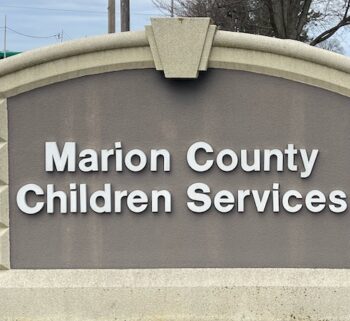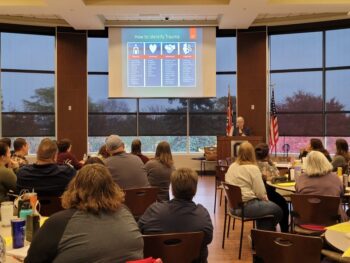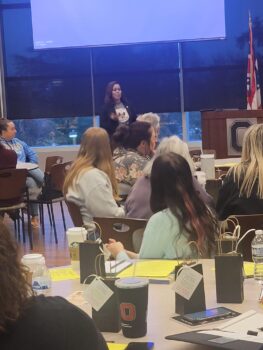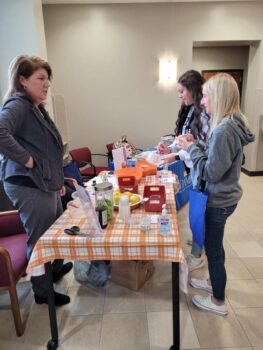Nearly 100 teachers, school counselors, school resources officers and juvenile court officers are starting the year with a deeper understanding of trauma and how to help Marion County children who have experienced it.

What is Trauma? How many kids experience it?
Trauma can be caused by many events, from the death of a loved one, a school shooting, sexual or physical abuse or neglect. It can also be caused by a caregiver with untreated mental health or substance use disorders.
By age 16, two-thirds of American children report a traumatic event according to the Substance Abuse and Mental Health Services Administration.
For teens involved in the juvenile court system, at least 75% are estimated to have experienced trauma, and many have experienced a lifetime of violence, according to the National Child Traumatic Stress Network.
Local Agencies Respond
The Marion-Crawford Prevention Programs (MCPP) sponsored the event with funds from the Marion Community Foundation. The Crawford-Marion Alcohol, Drug Addiction and Mental Health (ADAMH) Board also partnered with them for the Navigating Trauma Conference. The goal was to help educators understand why children with trauma act out and how to help them flourish. They also bought books on educating children with trauma for attendees.
Becky Haas: International Pioneer

Speaker Becky Haas, an international national pioneer in trauma-informed care, emphasized that there is hope.
“When a flower doesn’t bloom, you fix the environment. You don’t fix the flower,” Haas said.
She quoted Josh Shipp, who aged out of foster care, who says, “Every child is one caring adult away from being a success story.”
Trauma Impacts Brain Development
Speaker Carol Taylor talked about brain development and how it is impacted by trauma. Survivors of trauma may over-react to a situation because the brain interprets it as a threat to the child’s survival and they fight or flee.
“We can’t build on a foundation that is broken. We have to build that foundation up,” Taylor said. “These kids aren’t bad. Bad things have happened to them. Sometimes teachers are the first safe person in a child’s life.”
Taylor offered tips on how to help children regulate their emotions.
Taylor said, “When you see chaos, share your calm.”

Caring Adults Make a Difference
Caring adults can help children who have experienced trauma, according to the U.S. Centers for Disease Control and Prevention.
“Positive interactions can help kids heal from the past and protect them from future adversity,” Haas said.
Haas said each child needs to know they are safe, they belong, they can make mistakes without feeling judged, and people will help them.
“Every child needs at least one adult who is irrationally crazy about them,” Haas quoted developmental psychologist Urie Bronfenbrenner.
When children feel adults care, graduation rates improve and problem behaviors decrease.
“Kids aren’t attention-seeking; they are connection-seeking,” Haas said.
Caring, listening, and connecting were critically important. Letting a child from a hard place talk about their favorite topic for just two minutes each day can make a difference.

Panel of Local Speakers Shares Insights
In addition, those who survived childhood trauma and now volunteer as family peer supporters through NAMI (National Alliance on Mental Illness) shared their experiences recovering from trauma or seeking help for a child with mental health struggles.
”There’s a purpose for our pain,” said Sarah, who is now a chemical dependency counselor.
Another speaker described being terrified her abuse father would kill her. A school counselor made her feel safe and helped her.
“One person can make you feel hope,” said Caitlin.
Tenisha, a mother of a child with serious mental health disorders, said support helped her.
“I understood that my child was hurting. She wasn’t just hurting me,” Tenisha said. “I thought my daughter was being unruly. She had a mood disorder. NAMI helped us learn how to help her regulate her. I have more skills now.”
Tenisha tells other adults to give grace to themselves and children while still setting healthy boundaries.
Teacher Feedback
Attendees gave positive reviews.
“This conference was FABULOUS! Kudos! Thank you for bringing this information to us here in Marion County. It’s so important. I wish every teacher could hear this first-hand,” one attendee shared.
For more info or to find help:
Recognizing and Treating Child Traumatic Stress | SAMHSA
Marion-Crawford Prevention Programs (MCPP)
Welcome to MCADAMH – Crawford-Marion ADAMH
MarionMade! is a program of Marion Technical College.


















